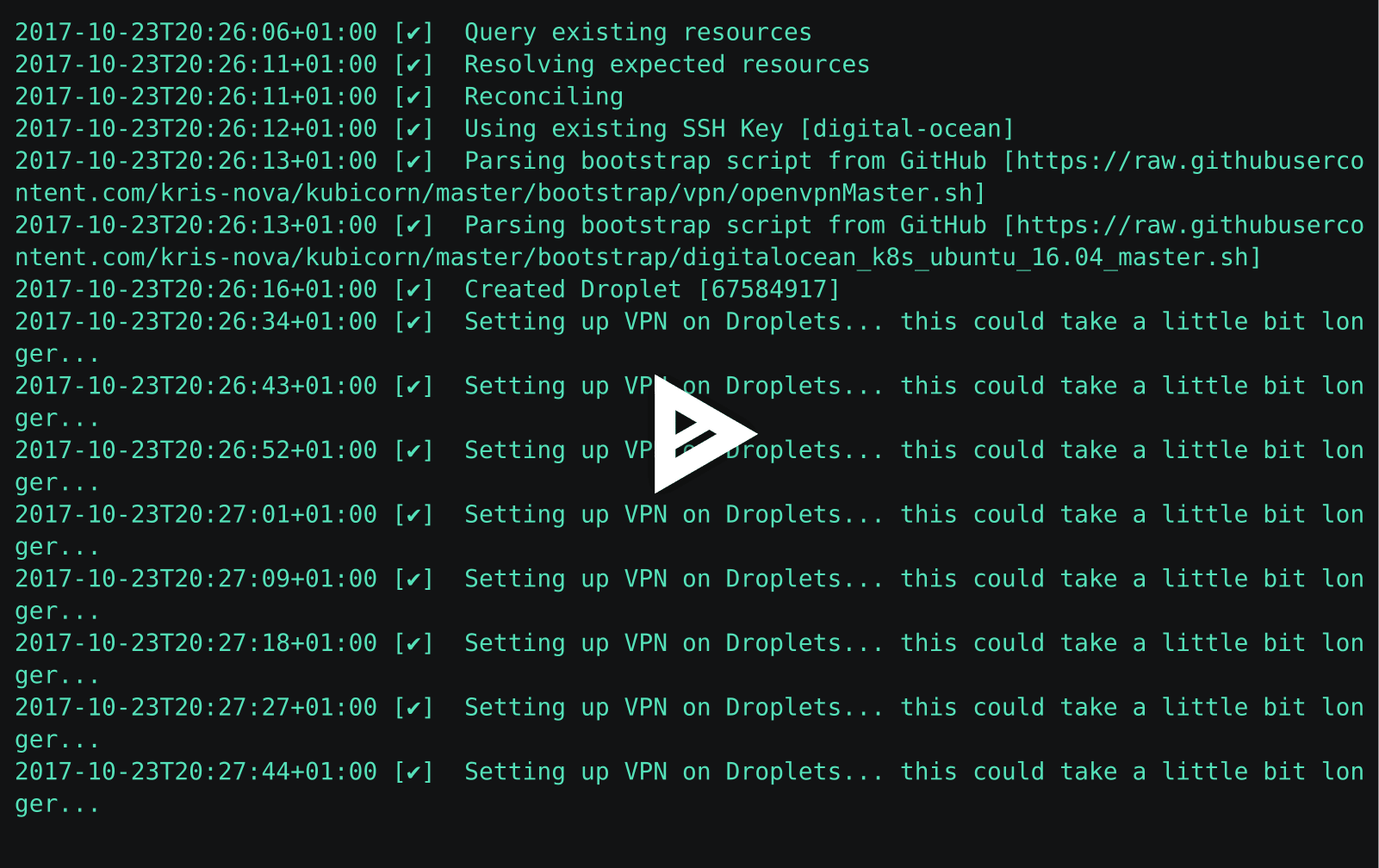Create, manage, snapshot, and scale Kubernetes infrastructure in the public cloud.
Phonetic pronunciation: KEW - BHIK - OH - AR - IN
- Kubicorn will be going through a breaking API change as we adopt the upstream cluster API
- Kubicorn has moved to
github.com/kubicorn/kubicornpermanently. - Kubicorn will be targeting a stable release shortly!
kubicorn is a free and open source project that solves the Kubernetes infrastructure problem and gives users a rich golang library to work with infrastructure.
kubicorn is a project that helps a user manage cloud infrastructure for Kubernetes.
With kubicorn a user can declaratively create new clusters, modify and scale them.
NOTE: This is a work-in-progress, we do not consider it production ready.
Use at your own risk and if you're as excited about it as we are, maybe you want to join us on the #kubicorn channel in the Kubernetes Slack community.
Previously, we mainly used a channel in the Gophers Slack community, which is still active, but we're moving to the Kubernetes Slack. You can also get involved and send your questions to our public mailing list.
We hold developer calls biweekly on Tuesdays, 1pm Pacific Time. By joining the mailing list, you'll get a calendar invite.
 Proudly packaged with Golang dep
Proudly packaged with Golang dep
This is a community driven project. We love you, and respect you. We are here to help you learn, help you grow, and help you succeed. If you have an idea, please share it.
We are all software engineers, and we all work in many different code bases. We want the code to be stable, and approachable. We strive for clean and simple software, and we encourage refactoring and fixing technical debt.
We want our tool to work, and work well. If an operator is running kubicorn it should feel comfortable and make sense to them. We want operators to feel empowered.
We believe that the oh-so important layer of infrastructure should be represented as software (not as code!). We hope that our project demonstrates this idea, so the community can begin thinking in the way of the new paradigm.
We believe that sharing is important, and encouraging our peers is even more important. Part of contributing to kubicorn means respecting, encouraging, and welcoming others to the project.
$ go get github.com/kubicorn/kubicorn..or read the Install Guide.
This asciicast shows how to get a Kubernetes cluster on DigitalOcean using kubicorn in less than 5 minutes:
kubicorn lets a user create a Kubernetes cluster in a cloud of their choice.
Define what you want, then apply it. That simple.
kubicorn is powered by a state enforcement pattern.
A user defines the intended state of Kubernetes infrastructure, and kubicorn can enforce the intended state.
kubicorn is built as a library and a framework. Thus allowing it to be easily vendored into operator and controller patterns to enforce intended state of infrastructure.
| Name | Description | Link |
|---|---|---|
| Install | Install guide for Kubicorn CLI | install |
| Environmental Variables | Master list of supported environmental variables | envvars |
| Kops vs Kubicorn | Blog about kubicorn with comparison table | nivenly.com/kubicorn |
| Azure Walkthrough | A walkthrough guide on installing Kubernetes on Azure | walkthrough |
| AWS Walkthrough | A walkthrough guide on installing Kubernetes on AWS | walkthrough |
| DigitalOcean Walkthrough | A walkthrough guide on installing Kubernetes on D.O. | walkthrough |
| DigitalOcean Quickstart | A quickstart asciicast on installing Kubernetes on D.O. | asciinema |
| Google Compute Engine Walkthrough | A walkthrough guide on installing Kubernetes on GCE | walkthrough |
| OVH Walkthrough | A walkthrough guide on installing Kubernetes on OVH | walkthrough |
| OVH Video | A quickstart asciicast on installing Kubernetes on OVH | asciinema |
| Packet Walkthrough | A walkthrough guide on installing Kubernetes on Packet | walkthrough |
| AWS Video | A step by step video of using Kubicorn in AWS | video |
| DigitalOcean Video | A step by step video of using Kubicorn in DigitalOcean | video |
| Tech N Talk Deep Dive | A technical deep dive courtesy of RedHat | youtube |

